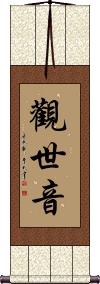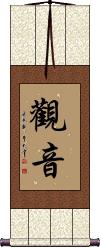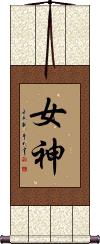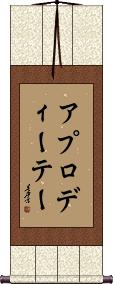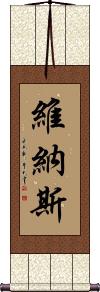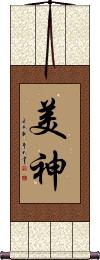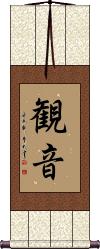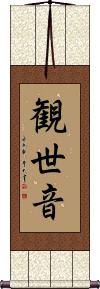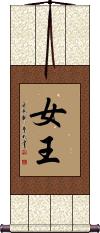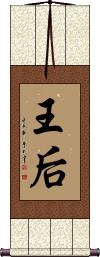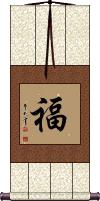Many custom options...
And formats...

Sun Goddess in Chinese / Japanese...
Buy a Sun Goddess calligraphy wall scroll here!
Personalize your custom “Sun Goddess” project by clicking the button next to your favorite “Sun Goddess” title below...
1. Sun Goddess
2. Goddess of Mercy and Compassion
3. Goddess
7. Goddess of Beauty / Beautiful Spirit
9. Queen
10. Queen / Empress
11. Benzaiten
12. Manasa
13. Guan Shi Yin: Protector Of Life
14. Senju Kannon
Sun Goddess
天照皇大神 is the title for Sun Goddess or Amaterasu Oomikami in Japanese.
Rare Chinese Buddhists/Shitoists may be familiar with this (so I have included the Chinese pronunciation above) however, this should generally be considered a specifically-Japanese title.
Besides Amaterasuoomikami, this can also be pronounced/romanized as Tenshoukoudaijin. There are several similar ways to write Sun Goddess in Japanese, so don't be surprised if you see different forms on the web, etc.
Goddess of Mercy and Compassion
This is the long or more formal version of this title
觀世音 is the longer and perhaps more formal title for the Buddhist deity known as the Goddess of Mercy or Bodhisattva of Compassion.
The longer title of this bodhisattva is Romanized in the following ways:
Mandarin Chinese: Guanshi Yin, Kuan-shih Yin.
Japanese: Kanzeon.
Sanskrit: Bodhisattva Avalokitesvara.
Korean: Gwan-se-eum.
Vietnamese: Quan Thế Âm.
Thai: Prah Mae Kuan Eim.
English: Bodhisattva of Mercy and Salvation, Goddess of Compassion, Buddha of Mercy, et al.
Please view our more common and shorter version, “Guan Yin” before you make a decision. Also, note that the first character has a slight variation in Japanese. If your audience is specifically Japanese, you may want to select that version.
Goddess of Mercy and Compassion
觀音/観音 is the Buddhist deity known as the Goddess of Mercy or Bodhisattva of Compassion.
In Chinese, the proper name of this being is Guan Yin. There is some debate as to whether Guan Yin is female. The argument comes from some scripture that suggests Buddhist deities take on the male form. Others say that Guan Yin has no sex. And still, others are okay with the female representation of Guan Yin.
This bodhisattva is also known or Romanized in the following ways:
Mandarin Chinese: Guan Yin, Kuan Yin, Kwan Yin.
Japanese: Kannon, Kwannon.
Sanskrit: Bodhisattva Avalokitesvara.
Korean: Gwan-eum.
Vietnamese: Quan Âm.
Thai: Kuan Eim.
English: Bodhisattva of Mercy and Salvation, Goddess of Compassion, Buddha of Mercy, et al.
Note: The first character has a slight variation in Japanese. If your audience is specifically Japanese, you may want to select that version.
See Also: Buddhism | Goddess | Namo Amitabha | Bodhisattva
Goddess
女神 is Goddess from English or Dea from Latin in both Chinese and Japanese.
The literal meaning:
女 = Female or woman.
神 = Spirit, deity, soul, or saint.
Goddess Aphrodite
Goddess of Love: Venus
Goddess of Love: Aphrodite
Goddess of Beauty / Beautiful Spirit
In Chinese, 美神 means Goddess of Beauty.
The first character means beauty or beautiful.
The second character means spirit (can also mean god, goddess, or soul).
Some will use this as a short way to say, “Beautiful Spirit.”
This has a similar meaning in Japanese but is used more often as a female given name in Japan. As a Japanese given name, it can be pronounced Mikami, Mikan, or Binasu.
Goddess of Compassion
観音 is the specifically Japanese version of Bodhisattva of Compassion or Guan Yin.
In Japanese, this is pronounced Kannon and occasionally spelled Kwannon. The Chinese version is a bit more commonly seen in Asia. However, in Japanese, there is a slight variation with the first character.
Some time ago, a camera company in Japan named their company after this Buddhist deity. That camera company is still known as Canon (they chose a “C” instead of a “K” when they Romanized this name).
Goddess of Compassion
Long or more formal Japanese version of this title
観世音 is the more extended and more formal Japanese version of Bodhisattva of Compassion or Guan Yin.
In Japanese, this is pronounced Kanzeon. The Chinese version is a bit more common in Asia, but in Japanese, they use a slight variation of the first character. Choose this version only if your intended audience is specifically Japanese.
Queen
Queen / Empress
Wife of the King
王后 is another way to write queen in Chinese, Japanese Kanji, and old Korean Hanja.
王后 is sometimes used for the title of empress.
The first character means “king,” and the second means “wife,” or a short form to say “wife of the king/emperor.” So this is literally “king's wife” or “emperor's wife.” Some will translate this as “queen consort.”
Benzaiten
弁財天 is a Buddhist term that can be translated or transliterated as Benzaiten or Saraswati.
弁財天 is the Buddhist goddess of music, eloquence, wealth, and water.
This goddess of eloquence came into Buddhism from the Hindu goddess Saraswati. Benzaiten and Saraswati are considered by most to be one and the same. However, in Japanese culture, Benzaiten has been conflated with several other deities.
Manasa
Guan Shi Yin: Protector Of Life
Senju Kannon
Amaterasu Oomikami
Good Luck / Good Fortune
福 is pronounced “fu” in Chinese.
The character “fu” is posted by virtually all Chinese people on the doors of their homes during the Spring Festival (closely associated with the Chinese New Year).
One tradition from the Zhou Dynasty (beginning in 256 B.C.) holds that putting a fu symbol on your front door will keep the goddess of poverty away.
福 literally means good fortune, prosperity, blessed, blessedness, happiness, and fulfillment.
You'll also see this character in Vietnam (where Chinese characters were the written form until a romanization reform) where it is pronounced Phúc - a word commonly used in Vietnamese names because of its good meaning.
See Also: Lucky
The following table may be helpful for those studying Chinese or Japanese...
| Title | Characters | Romaji (Romanized Japanese) | Various forms of Romanized Chinese | |
| Sun Goddess | 天照皇大神 | amaterasuoomikami amaterasuomikami | tiān zhào huáng dà shén tian1 zhao4 huang2 da4 shen2 tian zhao huang da shen tianzhaohuangdashen | t`ien chao huang ta shen tienchaohuangtashen tien chao huang ta shen |
| Goddess of Mercy and Compassion | 觀世音 观世音 | guān shì yīn guan1 shi4 yin1 guan shi yin guanshiyin | kuan shih yin kuanshihyin |
|
| Goddess of Mercy and Compassion | 觀音 / 観音 观音 | kan non / kannon | guān yīn / guan1 yin1 / guan yin / guanyin | kuan yin / kuanyin |
| Goddess | 女神 | megami / joshin | nǚ shén / nv3 shen2 / nv shen / nvshen | nü shen / nüshen |
| Goddess Aphrodite | アプロディーテー | apurodiitee apurodite | ||
| Goddess of Love: Venus | 維納斯 维纳斯 | wēi nà sī wei1 na4 si1 wei na si weinasi | wei na ssu weinassu |
|
| Goddess of Love: Aphrodite | 艾福洛迪特 | à fú luò dí té a4 fu2 luo4 di2 te2 a fu luo di te afuluodite | a fu lo ti t`e afulotite a fu lo ti te |
|
| Goddess of Beauty Beautiful Spirit | 美神 | mikami | měi shén / mei3 shen2 / mei shen / meishen | |
| Goddess of Compassion | 観音 | kan non / kannon | guān yīn / guan1 yin1 / guan yin / guanyin | kuan yin / kuanyin |
| Goddess of Compassion | 観世音 | kan ze on / kanzeon | guān shì yīn guan1 shi4 yin1 guan shi yin guanshiyin | kuan shih yin kuanshihyin |
| Queen | 女王 | jo ou / joou / jo o | nǚ wáng / nv3 wang2 / nv wang / nvwang | nü wang / nüwang |
| Queen Empress | 王后 | ou kou / oukou / o ko | wáng hòu / wang2 hou4 / wang hou / wanghou | |
| Benzaiten | 弁財天 弁财天 | ben zai ten benzaiten | biàn cái tiān bian4 cai2 tian1 bian cai tian biancaitian | pien ts`ai t`ien pientsaitien pien tsai tien |
| Manasa | 摩納娑 摩纳娑 | mó nà suō mo2 na4 suo1 mo na suo monasuo | mo na so monaso |
|
| Guan Shi Yin: Protector Of Life | 觀世音 观世音 | kanzeon | guān shì yīn guan1 shi4 yin1 guan shi yin guanshiyin | kuan shih yin kuanshihyin |
| Senju Kannon | 千手観音 | senju kannon senjukannon | ||
| Amaterasu Oomikami | 天照大神 | amaterasu oomikami amaterasuoomikami amaterasu omikami | ||
| Good Luck Good Fortune | 福 | fuku | fú / fu2 / fu | |
| In some entries above you will see that characters have different versions above and below a line. In these cases, the characters above the line are Traditional Chinese, while the ones below are Simplified Chinese. | ||||
Successful Chinese Character and Japanese Kanji calligraphy searches within the last few hours...

